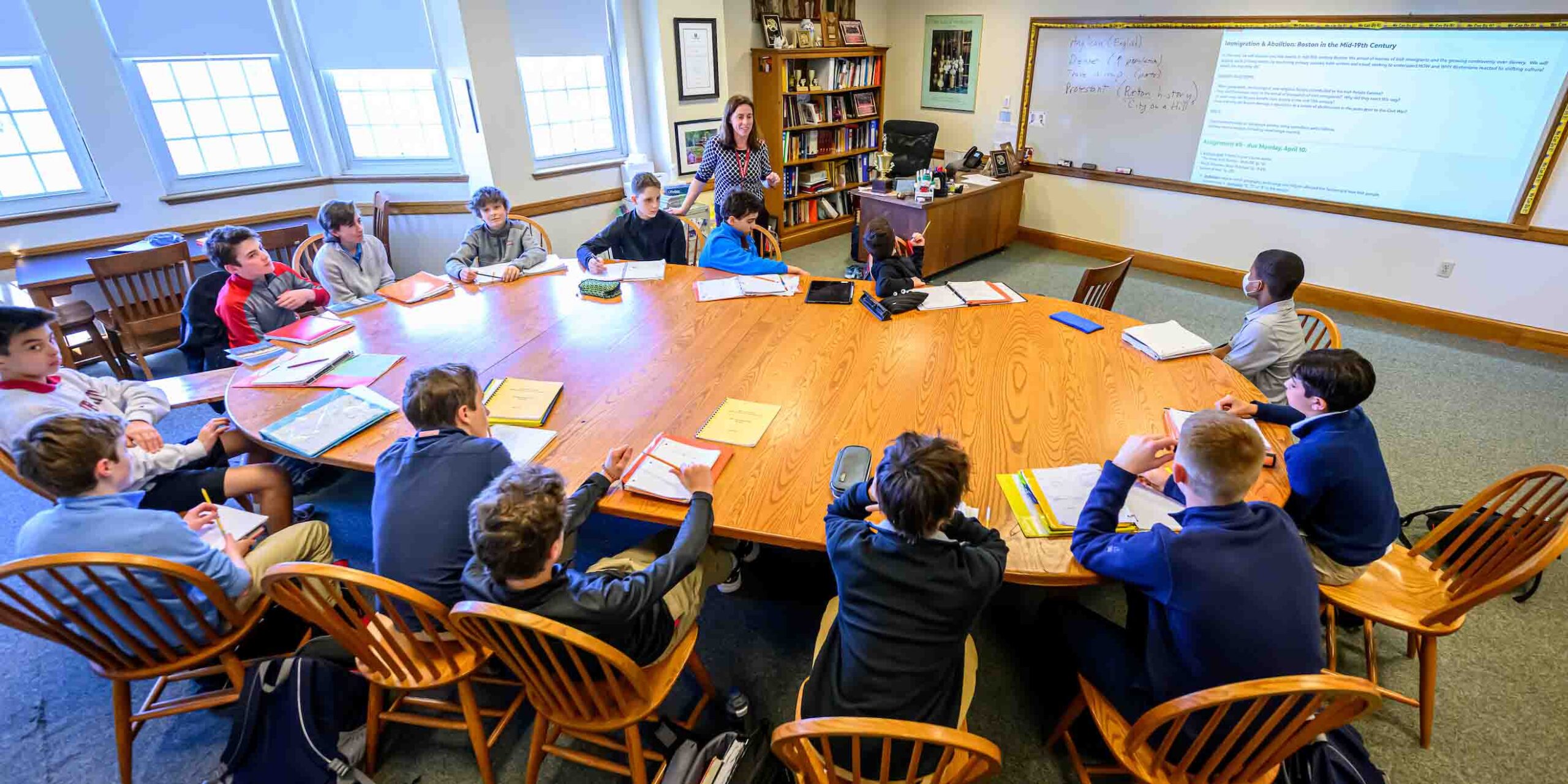历史
历史是一面镜子,学生可以在其中审视自己的生活。我们相信自知之明是智慧的先决条件,只有经过审视的人生才有价值。我们希望这里的历史学习将成为我们学生现在和将来生活中智慧和价值的来源。罗克斯伯里拉丁学校的男孩们学习历史是为了认识他们自己是有道德的人,是人类故事的参与者,是人类大家庭的成员。如果他们要认识自己,年轻人需要接受他们的个人故事和人类的伟大史诗的融合。他们需要明白,制度和物质世界(他们也许认为这是理所当然的)是前人的思想、劳作和牺牲的产物。同样,由于人性是由人类过去的行为所揭示和定义的,对这些行为的了解对于一个人了解自己的本性和潜力是必不可少的。最后,对人类各种经历和状况的了解应该唤醒学生对他们的特权强加给他们的责任的认识。通过这些方式,历史确定了学生可以为他们的生活找到意义和目的的路径。
对历史的研究使学生能够看到人性的伟大和脆弱。一方面,过去是对愿望和成就的记录。另一方面,历史记录了一连串几乎不间断的犯罪和灾难。熟悉人类的高潮和低谷,熟悉人类的高尚和邪恶的个人,对于现实地了解自己和平衡地看待世界至关重要。认识到个人可以有所作为,认识到 "成功 "是短暂的,而正义、同情心和美是持久的,就是既谦卑又解放了。如果学生因此被引导去审视自己的生活,并能够更自觉、更正直、更负责任地生活,我们的课程就达到了主要目的。
罗克斯伯里拉丁语学校旨在培养学生成为人类社会的正式公民。今天,只有对过去和现在的文化和制度的多样性和复杂性有了广泛而深刻的认识,这种公民身份所需要的审慎而坚定的参与才有可能。这种意识首先要求了解我们所有人所生活的特定社区、社会和文化的传统和价值观--人类的缩影。第二,它需要对构成人类事业的其他社区、社会和文化有一定的了解。第三,它要求对政治和经济体系有一个分析性的理解,这些体系为当代人类的大部分活动创造了条件。我们相信,这样理解的历史意识对于创造性地参与他们的世界至关重要,我们希望我们所有的学生都能寻求并实现这一目标。
The history curriculum seeks to fulfill these purposes through a sequence of required courses plus a limited assortment of electives for upperclassmen. The content of these courses comes from a number of historical fields and from several of the other social sciences allied with history. History courses employ a variety of materials in addition to traditional textbooks: primary source documents, fiction, works of art, and monographs. While most history courses examine material in chronological order, none deals with all topics relevant to its subject. Rather than attempt to cover as much ground as possible, teachers select topics they judge to be most important or instructive. In general, our students study a limited amount of material thoroughly, although we are, to some extent, guided by College Entrance Examination Board prescriptions in AP U.S. Government and Politics and AP Economics, and we intentionally expose our youngest students to the sweep of human history in Class VI to lay a foundation for their future learning, both in the classroom and beyond.
历史课程
-
波士顿在人类历史上的地位
波士顿在人类历史中的地位,非正式地称为 "根与芽",是所有六年级男生必须参加的课程。学生们通过研究世界历史事件如何塑造了我们的身份和我们的生活方式,对波士顿的历史根源有了一个全球视野。学生们还探讨了从波士顿的历史中萌发出来的新芽,它们的影响超出了城市的范围,有时甚至是全球范围。通过强调地理、技术和宗教在影响各种人类系统(政治、经济和社会)方面的相互作用,学生有机会研究人们的运动和他们在时间中的方式,以更好地了解波士顿在人类历史中的地位。重点是发展历史学家的技能,了解历史上波士顿治理的演变,以及欣赏波士顿作为移民土地上的一个国际大都市。
-
五级公民单元
在5月份, 五年级的 公民单元 是在六年级历史课程中奠定的治理基础上进行的扩展。该单元旨在加强学生对政府运作方式的理解,并探索个人通过参与政府和与政府互动能够并确实发挥作用的方式。重点是选举程序、陪审团职责、兵役、知情权和通向公民身份的道路。本课程由团队授课,并受益于特邀专家的演讲。
-
西方文明。批判性探索
Western Civilization: A Critical Inquiry, required of all boys in Class IV, is an intentionally classical and interdisciplinary course that seeks to provide students with an awareness of humanity’s recurring problems, a perspective on our own time, and an appreciation of consequential historical figures: the complex dilemmas they faced, the decisions they made, and the impact of those decisions. The course also explores how science is reshaping our understanding of the medieval period globally, and raises the sights of boys in terms of arts appreciation by complementing, reinforcing, and supplementing the arts curriculum in other areas of the overall Roxbury Latin experience. In addition to skills development for analytical essays, documented papers and oral presentations, students research, produce and orally defend a model or reproduction of a building (or group of buildings), historical scene, work of art, or artifact from anywhere in the world, making deep and explicit connections to historical themes or ideas from the course, analyzing artistic elements, and applying rhetorical skills.
-
Modern European History
Modern European History is an elective for members of Class III. Through the study of European history from 1450 (the High Renaissance) to the present, this course traces major developments in political and diplomatic history against a backdrop of social and economic change, creating the context for better understanding contemporary institutions and modern intellectual and cultural forces that fundamentally shape our world today. Emphasis will be placed on analysis of both historical evidence and historical interpretation through class discussion and expression of historical understanding in writing. Because the narrative of European history necessarily involves engagement with the global economic force of imperialism and global conflicts (WWI & WWII), this course seeks to lay a sure foundation for the study of U.S. History and other history department electives.
-
世界宗教、哲学和多代人的历史
World Religions, Philosophies, and Multigenerational Histories is an elective for members of Class III. As complex features of history, religions and philosophies deal with life’s big questions and can inform people’s sense of morality in positive ways, but they can also interact with changing social systems and political ideologies with harrowing historical consequences. In this course, documentary videos provide the 30,000 foot view of the Communist Revolution in China, apartheid in South Africa, the plight of refugees in war-torn Iraq, and the dislocation of indigenous people in the U.S. and Canada. This sets the stage for reading multigenerational, family histories that make the period accessible and observable as different generations of the same family respond to historical change across time. The study of Taoism, Buddhism, Confucianism, Islam, and Native American religion exposes students to the richness of world religions and philosophies as a subject of study, and the family histories of 21st century authors Trevor Noah, Thaer Abdallah, Richard Wagamese, and Scott Tong make the lived experience of their families relatable, and the history itself unforgettable. Methods for exploring one’s own family history receive particular emphasis in this course.
-
美国历史
R本课程要求所有一年级或二年级的男孩参加,旨在培养具有历史知识的公民,对美国经历的复杂性有一个感性的认识,并热爱对我们国家过去的批判性研究。该课程侧重于三个核心主题:1)经济和社会现实的恒定和变化;2)美国政治生活的分水岭式变化以及对政府在保护生命、自由和财产方面作用的解释;以及3)美国在世界的地位。学生为一篇主要论文进行研究,从与课程单元之一相关的主题中选择(由教师决定)。在课程的最后一个单元,学生进行一个与美国近期历史有关的口述历史项目。核心读物以大量原始资料文件作为补充。
-
AP经济学
AP经济学,提供给I类成员,是研究个人、公司和社会在使用稀缺资源提供物质福利时必须做出的选择。本课程介绍了微观和宏观经济分析的工具。宏观课题包括经济组织的市场体系、经济增长、生产力、政府的作用、金融体系、通货膨胀、失业、短期经济波动、汇率决定和理论争论。微观课题包括供求分析的应用、弹性、生产理论、产业组织(包括垄断和寡头垄断)、劳动力市场、收入不平等、外部因素、贫困和贸易。只要有可能,我们将考虑国际层面和比较。要求学生掌握入门的经济理论,参加辩论,并在一定程度上分析问题。此外,学生还需要熟悉 《中国经济周刊》中 介绍的当前经济事件 。 华尔街日报, 纽约时报或者 经济学家》杂志.该课程的一个主要目标是介绍基本的经济原理和经济学家在分析中使用的各类问题和技术。最后,学生还将熟悉互联网上的各种数据来源。学生必须在5月参加高级课程微观经济学考试和高级课程宏观经济学考试。
-
AP美国政府与政治(秋季)课程
AP美国政府和政治学是第一学期的选修课,是提供给在第二课堂中以美国历史为先决条件的第一课堂成员的配对选修课。
Recent and ongoing challenges to our democratic norms and institutions demonstrate the resilience of our democracy, but also its fragility. Democracy depends on informed and active citizens who can make serious, evidence-based arguments in a world where there is a loss of agreed-upon facts, basic rights are threatened, and the media landscape is profoundly changed. As a culminating experience in the study of American history at Roxbury Latin, AP U.S. Government and Politics concentrates on the concepts, institutions, and behaviors that characterize and animate our constitutional system and political culture. The news of the day also feeds our discussions in this course weekly, sometimes daily. Students are required to take the Advanced Placement U.S. Government and Politics Exam in May.
-
创造共同利益(春)。
创造一个共同利益这是第二学期的选修课,是提供给在第二课堂上以美国历史为先决条件的第一课堂成员的配对选修课。
What do we owe one another? Across time, this question has shaped the ideas of thinkers who have pursued something called a “common good.” How to define and achieve a common good has animated the reform movements, utopian experiments, protest literature, and identity politics that have emerged in response to social and political challenges throughout world history. Through its exploration of fundamental questions about the relationship between the individual, society, and the state, this course builds on the topics and concepts students study in AP U.S. Government and Politics. An intellectual history course at its core, Creating a Common Good offers students deep engagement with texts from global wisdom traditions that have influenced how we think about economic markets and morality, law and society, identity and urban geography, nature and technology, and education and democracy.
-
全球冲突
全球冲突,提供给在第二课堂中以美国历史为先决条件的第一课堂成员,将探讨二十世纪主要全球冲突的原因、过程和后果。
在第一学期,学生们将探索伟大的战争,或 "结束所有战争的战争"。以前的任何战争都没有看到工业、科学、技术以及欧洲、其殖民地和美国的大量人口在这样一场灾难性的冲突中走到一起。本学期我们将探讨这场战争在大西洋两岸的起因,它在世界各地的不同战线,种族和性别的作用(这场战争导致了美国人最大的一次赋权),以及塑造了欧洲、美国、现代中东、非洲和亚洲的后果。学生将重点阅读和分析各种主要和次要资料,并撰写几篇研究论文。
在第二学期,学生将研究二十世纪中后期主要冲突的社会、政治和经济影响,从法西斯主义在意大利、日本和德国的兴起以及围绕基于种族的纯洁性和文化同质性的意识形态所造成的灾难开始。在此基础上,学生们将考虑美国的反应,因为它从一个孤立的时期到成为第二次世界大战的关键参与者和战后世界的核心设计师。探讨的主题包括拘留日裔美国人、妇女在劳动力中的影响、结束国防工业中的歧视、以及禁止武装部队中的歧视。使用RL校友乔治-韦勒的文本 首先进入长崎 作为背景,我们还将探讨开发和使用原子武器的道德问题。其他主题包括冷战的形成,以及作为军事威胁的非国家行为者的现代发展。教学方法将以课程阅读、原始资料分析、研究和历史写作为基础。
在课程结束时,学生应该能够有效地辩论重大的全球危机如何塑造了二十世纪以及美国在其中的作用。

